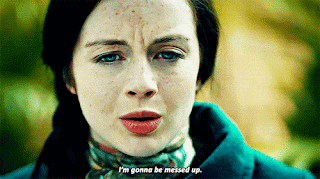Over the years I have written and talked about isolation quite a lot. Much of the basis for this very blog is my glorification of isolationism and my perceived "choice" to be socially isolated. I like being alone, I like to spend time alone, and I work best when I'm alone. There is nothing wrong with this... but realize that I have maintained my isolation since the beginning of this blog over five years ago. In that time, I have moved over a dozen times and moved to three different states. I went to college, dropped college, went back to college, joined a church, left a church, got work writing, got married, had a baby, ended a marriage, I've participated in art shows, I've gone to literary festivals, published a book, and even went to a few purely social events...and have come up at the end of this trip around the country with absolutely no in-person social network. There is a fine line between an active choice and a pathological behavior. I have more than crossed that line.
There are studies that show social disconnectedness is actually a death hastening phenomena akin to obesity and some addictions although, like many mental health and mortality studies, it's inconclusive as to how exactly isolation affects health so seriously. But when it's taken into account that serotonin and dopamine are what causes happiness and that oxytocin is an anti-depressant, it seems abundantly clear that we have to treat our brain and our mind for what they are - physical. We wouldn't like leave an open wound to fester. The mental reward system for some of us - myself included - counters the very basic human factor of being a social animal. We get less happiness from our interactions and we may experience excess cortisol when attempting social contact. That essentially means that the effort and fight-or-flight-or-freeze response is stronger than the happiness we experience when we have friends. Friendships are formed during frequent social contact and that's a lot of work. It just isn't worth it.
At least, that's what we tell ourselves. There are many reasons a person may self-isolate, ranging from depression to certain personality disorders to being on the autistic spectrum. I'm on the spectrum. Many of my online friends are on the spectrum or personality disordered and we often pride ourselves in how well we do without much social contact. But I take note of my own behavior and sometimes I wonder if they're pacing holes into the floor as they sink into their fantasy lives that provide just a sliver of oxytocin - I wonder if they've tricked themselves through maladaptive daydreaming. I wonder how functional we really are that our sensory processing doesn't allow for regular social contact. I wonder how apathetic we are when we make a friend-attempt a few times a year and it blows up in our faces. I think about the kind of people our isolation and loneliness attracts. And it just isn't a pretty picture.
The perks of being primarily fine and dandy without friends is that we are choosy about who we'll let into our lives. We may have high standards, be independent, introspective. We're likely very good at a few things that occupy our time. The downside of genuine desperate loneliness is that sometimes we may interact with people unworthy of our time just for relief. The downside is missed opportunities, of disabling inability to socialize even to work, and our deteriorating health. The downside - and it sounds like a contradiction - is that perceived loneliness is contagious. All it takes is for one person in a social circle to feel lonely and misplaced for the entire structure to be shaken and then you don't just feel lonely, you become isolated, and your cues will make others perceive themselves as lonely around you. One persons perception of loneliness creates a reality of loneliness for each party involved, even if only briefly.
I have no immediate plans to make friends. And in all honesty, I would not know how to begin. Is the isolation still a choice? Is this intentional, conscious, did I make myself the center of the universe? Or is this pathological self-defeating behavior that will, in the end, deteriorate my health and leave me with little more than a daydream on my death bed? Perhaps it is both. Perhaps it's not out of the question that we have fooled ourselves and we are not simply being introverts. I advocate alone-time as much as I advocate breathing. But maybe in this moment, if only once, I should encourage others like me to consider deeper connections in-person. It could save your life.
Dizzy.





